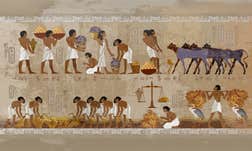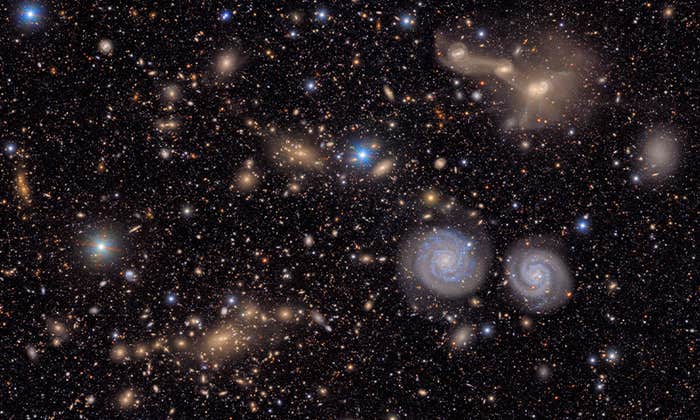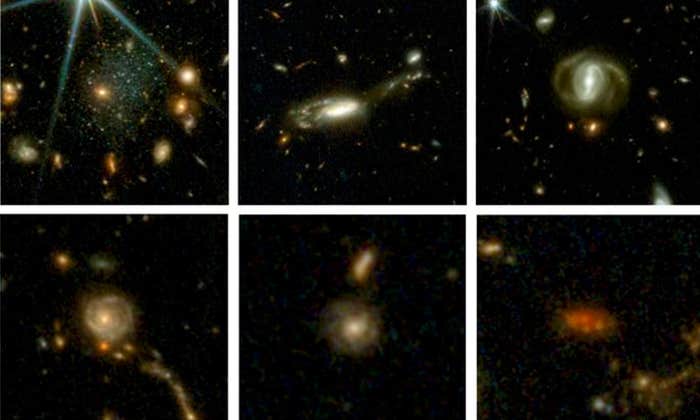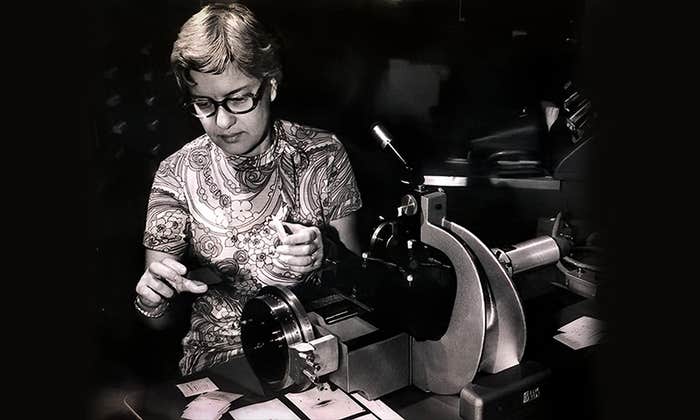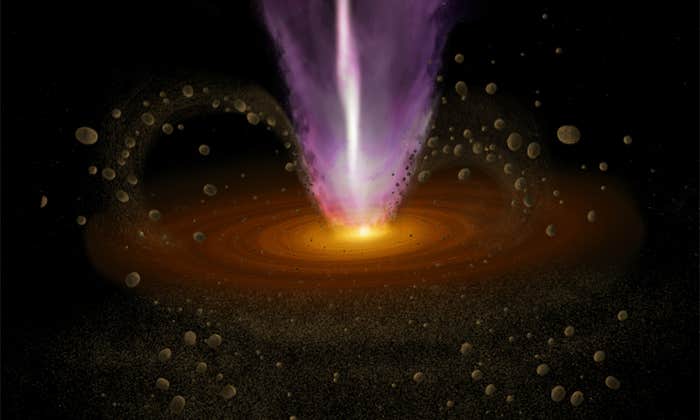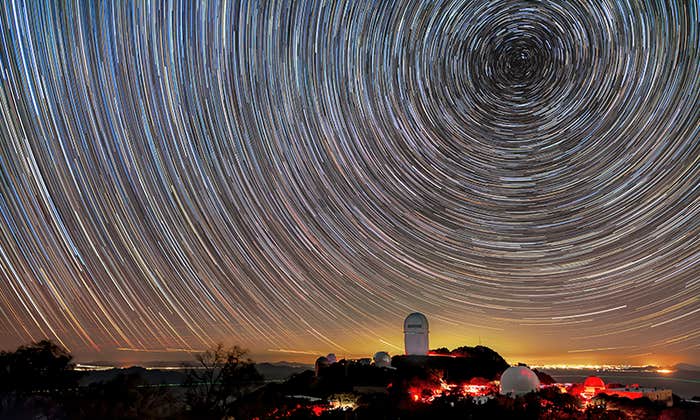I walked out of the airlock onto the blood-red Martian surface. My mind was crystal clear and laser focused. There was no room for panic or anxiety as I surveyed the landscape and remembered the job ahead. I had conditioned my body to instinctively complete the tasks at hand.
1. Triple check that the life support in my backpack is functioning and I can feel the stream of air tickling my face. My life depends on that trickle of air.
2. Triple check that the airlock pressure matches the Martian ambient atmospheric pressure of 6 millibars before exiting the Hab, our home, so I don’t blow it up into oblivion.
3. Communicate with HABCOM, my colleagues remaining in the Hab, to tell them that the airlock is secure. With everything checked, it was finally time to …
4. Walk on Mars.
In reality, I was at an altitude of 8,200 feet on Mauna Loa, one of the world’s largest volcanoes, on the Big Island of Hawaii, completing an analog astronaut mission. I am a Ph.D. candidate in astrophysics at UC Berkeley and Lawrence Berkeley National Lab, where I research supernovae and computational cosmology. I study exploding stars, tracing them from birth to death, to learn more about their physics and how they might reveal untold secrets of the universe. Ultimately, my goal is to be an astronaut and study the traces of exploded stars in the rocks on the real Mars.
I’d known I wanted to devote my life to exploring the night sky since I was 5 years old.
This summer I was selected for an Analog Astronaut Mission in collaboration with NASA Goddard and the International Moonbase Alliance, as a field test to replicate living as an astronaut. Currently, these missions focus on Mars and the moon, though there is some interest to expand them to sites like the Jovian moon Europa. It was a dream come true to be selected for a Mars analog mission—and a stepping stone to one day becoming an astronaut and getting to do the real thing.
I felt a rush of shock and accomplishment when I walked on “Mars.” I’ve devoted my life to reaching for the stars, ultimately with the goal of conducting astrophysics research on another planet. I was struck by the moment of realization that I’ve now accomplished a big goal of mine—alongside the reminder that I still have so much more to explore.
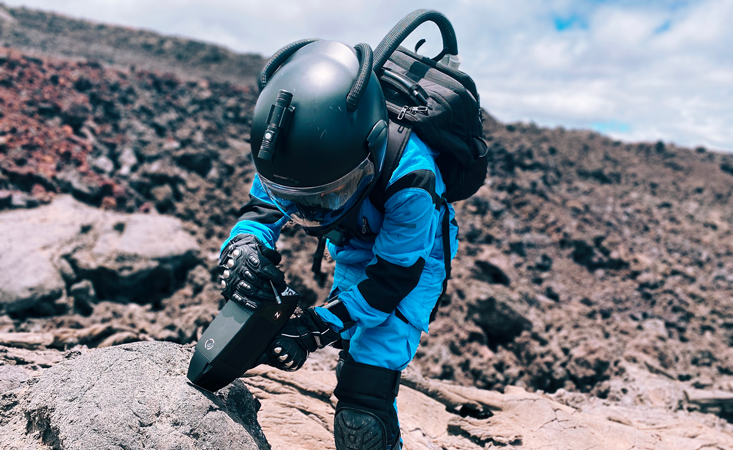
I’d known I wanted to devote my life to exploring the night sky since I was 5 years old. I used to spend my nights stargazing with my dad, my best friend, and he’d point to shooting stars as we spent hours under the wide Texas sky. On the way home from school each day, my mom dialed our Volkswagen radio to NPR just in time for Star Date, a short radio segment introducing daily cosmic phenomena. I would rest my head against the suede of our car door and let my eyes droop, allowing the ethereal music to lull me into calm as I pictured glowing stars dancing across my eyelids.
As I grew older, my passion for the stars only grew greater and greater. As my parent’s marriage crumbled and my anxiety took form, I sought out the night sky on long midnight walks. I channeled my anxiety by becoming a workaholic, a perfectionist. My hard work was praised by my parents, coaches, and teachers, and I let it fuel me, becoming the singular force that drove me forward. If I got anything less than an A+ I would crumble, allowing my anxiety, and perhaps something deeper, darker, to take hold. The thoughts that consumed me, “I’m stupid, I’m not worth anything, I’m a failure” became the constant buzz that rippled through me whenever I would take breaks. I became an insomniac, avoiding sleep at all costs, to keep the clawing terror at bay.
When I bashfully confessed that I want to grow up and be an astronomer, he said, without missing a beat, “No, you don’t. This isn’t for you.”
Aside from work, the only reprieve from my anxiety was the night sky. On my midnight walks, I would often lie down in the grass and stare unblinkingly up at the canvas of stars above. The longer I looked, the more I would see, and the never-ending abyss was comforting. It wrapped around me like a warm blanket, reminding me of how small we are in the grand expanse of the universe. There are other worlds orbiting their home suns, making up the fabric of billions of galaxies in a forgotten corner of our universe. Up there, my successes and failures mean nothing. There is nothing but that unending abyss, peering down at us, at me, and waiting … waiting for us to explore.
Despite my love for the cosmos, I struggled in math and physics. During my introductory algebra class, the school Dean went so far as to tell my parents that “girls just aren’t cut out for this sort of thing.” When I took Algebra II a few years later, my teacher, a 60-something white man, looked out at my class and bluntly told us that the only people who would ever succeed in a quantitative field were the four boys sitting next to me. My friends and I looked at each other, eyes gleaming in hurt, and our dreams flashed across our eyes: Me, astrophysicist; Alia and Lillian, doctors; Sibel, bioengineer.
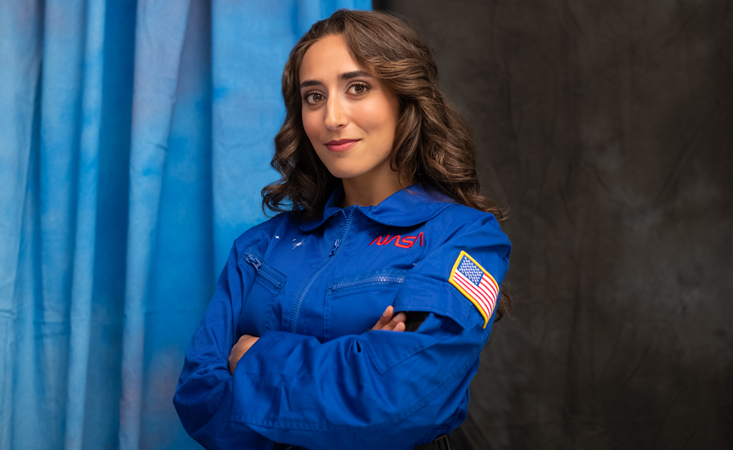
One summer, I attended a science camp out in middle-of-nowhere Texas. I spent two weeks gallivanting through the underbrush and swimming across a deep blue lake, savoring the reprieve from my parents and school. I learned how to identify damselflies and take soil samples, what to do when we spotted a brown recluse and how to not bang my head against the ceiling when I’d rise from the towering bunk beds. But the thing I looked forward to most was the final night of camp, when an astronomer was to visit and let us peer through his telescope. I counted down the days in my little blue notebook, a diagonal stripe for each completed day.
On that final night, I rushed out to meet the astronomer. My hands were shaking in excitement when I introduced myself, throwing glances toward the immense black telescope behind him. But the excitement wasn’t reciprocated, and when I bashfully confessed that I want to grow up and be an astronomer, he looked me directly in the eyes and said, without missing a beat, “No, you don’t. This isn’t for you.” I paused, sure I misheard, but he just kept staring at me, making no effort to hide the derision warping his smile and damning his gaze.
Without struggling through—and sometimes failing—various physics assignments, I wouldn’t have grown resilient.
I was never entirely sure what I did to garner such judgment. As the years passed and I entered college as a physics and astronomy double major, the vitriol and gatekeeping only increased. Whether it was my brown skin or Egyptian curls, or simply the fact that I was often the only girl in classes of a hundred boys, I always felt out of place. Faculty and classmates alike reminded me—often—that I don’t fit in.
It wasn’t just the sexist jokes (“Who’d you have to fuck to get into this class?”) or the blatant disregard when male professors ignored my questions and pretended that I didn’t exist. It was the internal dialogue, as I absorbed all of the judgments and condemnations, that was most toxic. I would fall asleep to night terrors and wake up sweating, their words circling in my head and feeding my vultures of anxiety. I got seriously ill: first, pneumonia, then a particularly bad strain of the flu, my body physically rebelling against the stress I was putting it through.
But I refused to quit. I might not be a natural-born physicist—I struggled, a lot, to wade through the foreign equations in front of me—but I loved astronomy. I spent my first summer in college at the McDonald Observatory, where I led talks on the sun and the stars, explaining how astronomers conduct research and teaching the intricacies of research telescopes. I loved communicating my love for the stars, loved sharing my passion for the cosmos. For I believed—and still do—that some of the most fundamental questions that humans can ask are written in the stars: Are we alone? How did the universe begin? How will it end?
So I endured. After five long years of physics classes and sexist jokes, I graduated with honors in physics and astronomy. To my utter surprise, I was nominated by the faculty to give the commencement speech for the University of Texas’ College of Natural Sciences. In my speech, I spoke candidly about the pain—and the importance—of failure. For without struggling through—and sometimes failing—various physics assignments, I wouldn’t have grown resilient. I wouldn’t have pushed the boundaries of what I can do and learned so much about the magic of our universe. Some part of me was grateful for that failure.
I also discussed the importance of communication. How as scientists, I believe it is our moral imperative to share the magic of what we learn with the world. Too often, scientists sequester themselves to the apex of the Ivory Tower, content with looking down on those who have not joined them. Looking back, I believe this is the beginning of my science communication career, though I did not know it at the time. It is also the most important message I shared that day, and one I refer back to often.
I fell in love with supernovae when I learned that our universe is not static; in fact, it is expanding. And shockingly, that expansion is accelerating with time. The very concept that our universe is constantly changing, growing ever outward propelled by some invisible force, hooked me. To this day, I get chills whenever I think of it. Some astronomers use supernovae to probe the fabric of dark energy, to try and determine exactly how fast the universe is expanding and how it changes with time. This is my passion, the question that keeps me up at night as I cast my gaze upward to the stars.
I will remain steadfast, asking questions and pushing the boundaries of what we know, what we can achieve, for a chance at a better world.
I took my passion for exploding stars to HI-SEAS, where I analyzed the composition of volcanic rocks to learn more about the formation of the early solar system and, perhaps, identify the supernova responsible. But research was only a portion of the analog astronaut experience. My crew of five and I went on EVAs, wore full spacesuits every time we left the Hab, rationed food and water, experienced a Martian time delay of 20 minutes for communications, and essentially simulated as much as possible of what life on Mars might be. We could not shower or call friends and family. We ate freeze-dried food and monitored all water intake, for we were limited to 100 gallons for two weeks. We stuck to a rigorous schedule: breakfast and mission debriefing in the morning, followed by an EVA or research in the Hab, lunch, EVA, research, and exercise in the afternoon, dinner, and mission reports. By the time we fell asleep, we were utterly drained. And I loved it.
There is something glorious about fulfilling a dream. During our first night EVA, I stayed still under the Milky Way, looking up at the glittering stars through my helmet, and took a deep breath. I proved to myself that I can do hard things. That despite the hardships and struggles, the contempt and the gatekeeping, I made it.
It was not without scars. I still feel like an imposter, still feel that I have to constantly achieve to prove that I deserve to be here. I often question my intelligence and my worth. I battle with anxiety and go to therapy weekly.
But thoughts I dared myself to dream, the ones I cast upward to the stars on those long midnight walks, carry me forward. They are the dreams that sing me to sleep and wake me with joy. It is because of them that I know in a far deep part of myself that I will never stop exploring. I will remain steadfast, asking questions and pushing the boundaries of what we know, what we can achieve, for a chance at a better world.
For a glimpse into the unknown.
To endeavor to understand and explore the universe, just as I work to untangle the universe within myself.
Sarafina El-Badry Nance is an astrophysicist, analog astronaut, science communicator, author of Little Leonardo’s Fascinating World of Astronomy and Starstruck (forthcoming 2023), and a fervent women’s health advocate. Sarafina currently lives in Berkeley with her partner and their dog, Comet. You can find her on Twitter and Instagram at @starstrickenSF.
Lead image: Dotted Yeti / Shutterstock


















